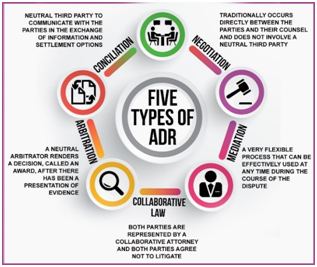

Context
Parliamentary Standing Committee on Law and Justice, headed by Sushil Kumar Modi, has recommended substantial changes to the Mediation Bill, meant for the institutionalization of mediation and establishment of the Mediation Council of India.
About
Mediation in India:
- Mediation is a structured, interactive process where an impartial third party assists disputing parties in resolving conflict through the use of specialized communication and negotiation techniques.
- It is a voluntary process where the disputing people decide to mutually find a solution to their legal problem by entering into a written contract and appointing a mediator.
Famous Mediation Cases - landmark decision by Supreme Court of India:
- Perry Kansagra Vs Smriti Madan Kansagra on 15 February, 2019
- Afcons Infra Ltd Vs M/S Cherian Varkey Constructions (2010)
- B.S. Krishnamurthy v. B.S. Nagaraj (2013)
Mediation India is divided into two categories which are commonly followed:
- Court referred Mediation: The court may refer a pending case for mediation in India under Section 89 of the Code of Civil Procedure, 1908.
- This type of mediation is frequently used in Matrimonial disputes, particularly divorce cases.
- Private Mediation: In Private Mediation, qualified personnel works as mediators on a fixed-fee basis. Anyone from courts, to the general public, to corporates as well as the government sector, can appoint mediators to resolve their dispute through mediation.
ADR
- Alternate Dispute Resolution (ADR) refers to the means by which disputes are settled outside the traditional court system.
- There are the modes of ADR in India:
- Arbitration
- Negotiation
- Mediation
- Lok Adalats

Why does India need the Mediation Act?
- Chief Justice of India (NV Ramana) addressed the inaugural Singapore-India Mediation Summit, 2021.
- He said the Indian judiciary is facing the pendency of cases crossing the 45-million mark, burdening the three-tier justice delivery system.
- He also stated that mediation should be made mandatory as the first step for dispute resolution and a law should be framed in this regard.
Key-highlights of the Mediation Bill, 2021
The Mediation Bill, 2021 seeks to promote mediation, particularly institutional mediation, and provide a mechanism for enforcing mediated settlement agreements.
- Pre-litigation mediation: Parties must attempt to settle civil or commercial disputes by mediation before approaching any court or certain tribunals.
- Even if they fail to reach a settlement through pre-litigation mediation, the court or tribunal may at any stage refer the parties to mediation if they request the same.
- Disputes are not fit for mediation: The Bill contains a list of disputes which are not fit for mediation. These include disputes:
- Relating to claims against minors or persons of unsound mind.
- Involve criminal prosecution.
- Affects the rights of third parties.
- Applicability: The Bill will apply to mediations conducted in India:
- Involving only domestic parties.
- Involving at least one foreign party and relating to a commercial dispute (i.e., international mediation).
- If the mediation agreement states that mediation will be as per this Bill.
- If the central or state government is a party, the Bill will apply to:
- Commercial disputes
- Other disputes as notified.
- Mediation process: Mediation proceedings will be confidential, and must be completed within 180 days (may be extended by 180 days by the parties).
- Mediators: Mediators may be appointed by:
- The parties by agreement
- A mediation service provider (an institution administering mediation).
- They must disclose any conflict of interest that may raise doubts about their independence.
- Parties may then choose to replace the mediator.
- Mediation Council of India: The central government will establish the Mediation Council of India.
- The Council will consist of a chairperson, two full-time members (with experience in mediation or ADR).
- Three ex-officio members (including the Law Secretary, and the Expenditure Secretary), and a part-time member from an industry body.
- Functions of the Council include:
- Registration of mediators
- Recognizing mediation service providers
- Mediation institutes (which train, educate, and certify mediators).
- Mediated settlement agreement: Agreements resulting from mediation (other than community mediation) will be final, binding, and enforceable in the same manner as court judgments. They may be challenged on grounds of:
- Fraud
- Corruption
- Impersonation
- Relating to disputes not fit for mediation.
- Community mediation: Community mediation may be attempted to resolve disputes likely to affect the peace and harmony amongst residents of a locality.
- It will be conducted by a panel of three mediators (may include persons of standing in the community, and representatives of resident welfare associations).
Important recommendation made by the Committee
- It recommended a singular controlling authority for all types of mediation service providers and mediation institutes, instead of multiple authorities proposed in a bill.
- The time limit provided for the completion of a mediation process should be capped at 90 days with an extended period of 60 days, instead of 180 days.
- The provisions should be made to authorize Mediation Council of India only as the single nodal authority to control mediation service providers and mediation institutes.



